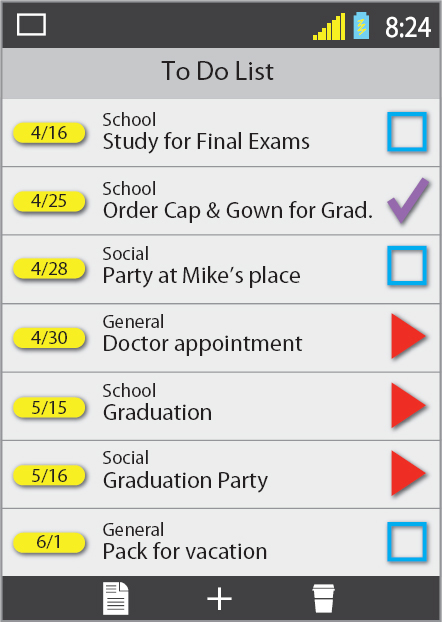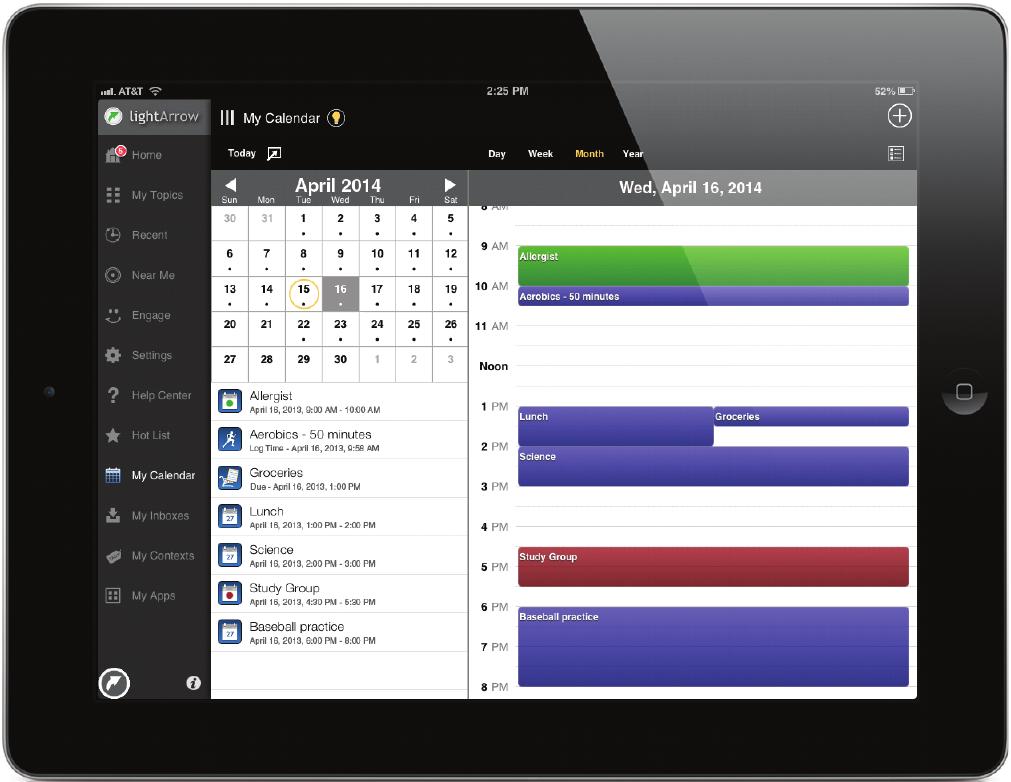Maintain a To-Do List
Is This You?
Do you find yourself in class, panicking because of an assignment that you forgot about until your instructor asked for it? How many times do you realize late at night that you have a test or paper due the next day? Are you falling behind in one or more classes because of missed or late work? Read the Tech Tip, and for at least one week try out a digital solution to your homework assignment woes.
Once you have plotted your future commitments with a term planner and decided how your time will be spent each week, you can stay on top of your obligations with a to-do list, which is especially handy for last-minute reminders. It can help you keep track of errands you need to run, appointments you need to make, e-mail messages you need to send, or anything you’re prone to forget. You can keep this list on your cell phone (see Figure 2.5) or in your notebook, or you can post it on your bulletin board. Some people start a new list every day or once a week. Others keep a running list and throw a page away only when everything on the list is done. Whichever method you prefer, use your to-do list to keep track of all the tasks you need to remember, not just academics. You might want to develop a system for prioritizing the items on your list: highlight; different colors of ink; one, two, or three stars; or lettered tasks with A, B, C. As you complete a task, cross it off your list. You might be surprised by how much you have accomplished—and how good you feel about it.

ORGANIZE YOUR DAYS
Being a good student does not necessarily mean studying day and night and doing little else. Notice that the Daily Planner (Figure 2.6) includes time for classes and studying as well as time for other activities. Keep the following points in mind as you organize your day:
- Set realistic goals for your study time. Assess how long it takes to read a chapter in different types of textbooks and how long it takes you to review your notes from different instructors and schedule your time accordingly. Give yourself adequate time to review and then test your knowledge when preparing for exams. Online classes often require online discussions and activities that take the place of face-to-face classroom instruction, so be prepared to spend additional time on these tasks.
- Use waiting time to review (on the bus, before class, before appointments). Prevent forgetting what you have learned by allowing time to review as soon as is reasonable after class. (Reviewing immediately after class might be possible but not reasonable if you are too burned out to concentrate!) Invest in tools (note cards, digital recorders, flash card apps, etc.) to convert less productive time into study time.
- Know your best times of day to study. Schedule other activities, such as laundry, e-mail, or spending time with friends, for times when it will be difficult to concentrate. If you have children or significant family obligations at home, plan to complete homework early in the morning or later in the evening when family members are asleep to maximize your concentration.
- Restrict repetitive, distracting, and time-consuming tasks such as checking your e-mail, Facebook, or text messages to a certain time, not every hour. This strategy is especially important if you take online classes and complete most of your coursework at home, where distractions abound.
- Avoid multitasking. Even though you might actually be quite good at it, or at least think you are, the reality is (and research shows) that you will be able to study most effectively and retain the most information if you concentrate on one task at a time.
- Let others help. Find an accountability partner to help keep you on track. If you struggle with keeping a regular study schedule, find a friend, relative, or classmate to keep you motivated and on course. If you have children, plan daily family homework times and encourage family members to help you study by taking flash cards wherever you go.
- Be flexible. You cannot anticipate every disruption to your plans. Build extra time into your schedule so that unexpected interruptions do not prevent you from meeting your goals. Also, be prepared for different time challenges with new classes every term.
